The views and opinions expressed in this article are those of the authors and do not necessarily reflect those of the National War College or ADRI.
In his first State of the Nation Address, Philippine President Rodrigo Duterte spoke a great deal about peace—peace that can be attained by “vigorously” addressing the historical injustices experienced by the (the predominantly Muslim and multi-ethnic population of Mindanao and the Sulu archipelago), by indigenous Filipinos, and by other marginalized groups. He stressed the importance of the peace process and, as much as possible, of avoiding violence. As he put it, “All of us want peace; not the peace of the dead, but the peace of the living.”
More order than peace
In Duterte’s peace and order, however, order is the priority. The president does not have pacifist vision of governance, and has exhibited no qualms with threatening or using force to achieve his desired ends. On July 25, for example, he unilaterally declared a ceasefire with the Communist Party of the Philippines’ National Democratic Front and New People’s Army (CPP-NDF-NPA). When five days went by without the group’s reciprocation, and after improvised bombs killed soldiers and civilians, he issued a 24-hour ultimatum. When that deadline passed, he revoked the ceasefire. Not five days later, on August 8, he threatened to suspend the peace talks wholesale.
At the start of July, Duterte termed members of the Abu Sayyaf Group (ASG) desperate men and not criminals. Yet, by the end of that month, the military launched an air and ground-based campaign against them. The president has said that the “full force of the [Armed Forces of the Philippines (AFP)] will be applied to crush these criminals who operate under the guide of religious fervor. The AFP shall enhance its capability to search and engage these rogue and lawless elements.” It is hard to get clearer than that.
Making good on his campaign promises and legacy as the former mayor of Davao, the president has exhibited the same impatience with crime. The continuing purge of individuals suspected of drug-related offences has been exceptionally newsworthy, with body counts rising by the day, and likely more than 600 individuals killed to date. Over several press conferences, Duterte has loudly called on drug bosses, their powerful protectors, and street-level pushers to turn themselves in. None are immune from Duterte’s decree, as Duterte has publicly named his targets and encouraged vigilantes to mete out violence against the accused with incentives such as bounties. Those who do not turn themselves in face death outside the bounds of law and criminal procedure; his police chief issued orders for one suspect to be shot on sight without yet having obtained a warrant for his arrest.
The one area of relative quietude in the Philippines’ peace and order situation is in the president’s dealings with the Moro Islamic Liberation Front (MILF) and the Moro National Liberation Front (MNLF). This is not for lack of activity: Duterte said he would “give” the MILF the Bangsamoro Basic Law, or the ill-fated bill operationalizing the Comprehensive Agreement on the Bangsamoro struck during the Aquino administration, but that he would delete passages in the bill that he considered unconstitutional. With the MILF on board, the president’s peace process advisor indicated that the Bangsamoro’s transitional body would re-draft the bill.
During the Aquino administration, the MNLF had criticized the government from excluding them in the drafting process; under Duterte, the MNLF and the MILF agreed to ‘harmonize’ their views into the new law. Fresh peace talks between the government and the MILF have been launched in Kuala Lumpur. Nevertheless, Duterte has pledged substantial increases in men and materiel to the AFP, attending to “the more pressing needs of our soldiers now engaged in focused military operation in Basilan, Sulu, Central Mindanao, and other areas in southern Philippines.”
Duterte’s pattern: offer, ultimatum, crackdown
Less than a hundred days in office, the Duterte government’s actions show an emerging three-step approach to imposing order. The first step is for the government, or Duterte himself, to set out the terms of engagement: drug offenders must turn themselves in; the NPA must lay down its arms; and the Moro rebels must accept the revision of their negotiated bill and the integration of their objectives into Duterte’s vision of a federal Philippines.
The government’s terms are usually accompanied with soft words or other overtures, as was the case with declared ceasefire. The administration’s moves are intended to signal the government’s genuine willingness to act, if not to accommodate the other parties’ wishes. With regard to the NPA, for example, the military’s spokesman has said: “The government has shown its sincerity and we expect no less from the other party.”
If the government’s target does not submit or reciprocate, an ultimatum of some form is issued. The NPA was given 24 hours to reciprocate the ceasefire. Certain drug targets were given up to 72 hours to turn themselves into the police. If not, the government will make good on its promise to deal harshly with the opposing side, to include fresh orders of military operations or police arrests. For the drug problem, the moves against high-value targets occur in tandem with door-to-door police visits in some communities to convince alleged drug pushers to surrender.
Sustainable support?
The president’s methods are undoubtedly controversial, even rousing “concern” from the U.S. Department of State, but there is no downplaying that at this moment he enjoys support from the public. Despite calls for greater respect for human rights, Duterte’s supporters argue that the president must do what is necessary for criminals to be brought to justice.
Of course, public support is easier to maintain in the early days, when both the positive and negative effects of these approaches are not yet fully apparent. Nevertheless, the debate has already begun in Manila over whether these methods will work. For the drug trade, recent articles in the Philippine press have questioned the effectiveness of a ‘war on drugs’, pointing out the failures of this strategy in other societies.
Outside the president’s hold of public support, the present situation in the Philippines also provides an opportunity to see how the Moro and Communist groups will position themselves vis-à-vis the remainder of the president’s policies, and if and how this will affect their respective causes. Thus far, the MILF and MNLF have towed the line; the MILF, for example, issued a statement supporting the president’s prerogative to bury former dictator Ferdinand Marcos in the national heroes’ cemetery. For their part, however, the CPP-NDF have withdrawn their support for Duterte’s drug war, opposed his decision over the Marcos burial, and rejected his call to abandon their use of improvised explosive devices, setting themselves the furthest apart from the president’s agenda. How the president treats these new alignments in light of the peace processes may be the fourth step in the Duterte pattern.
The Brookings Institution is committed to quality, independence, and impact.
We are supported by a diverse array of funders. In line with our values and policies, each Brookings publication represents the sole views of its author(s).
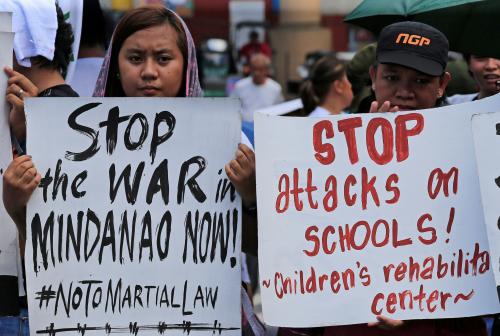
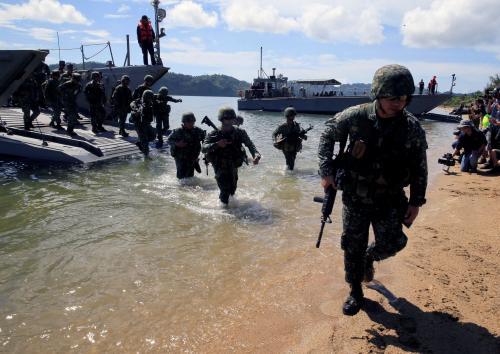
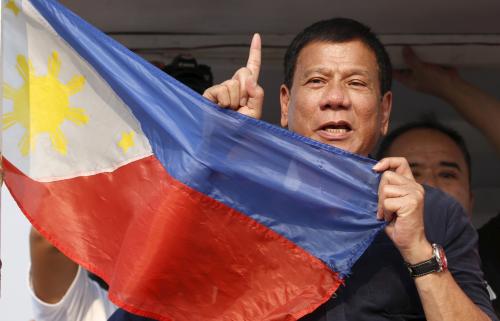
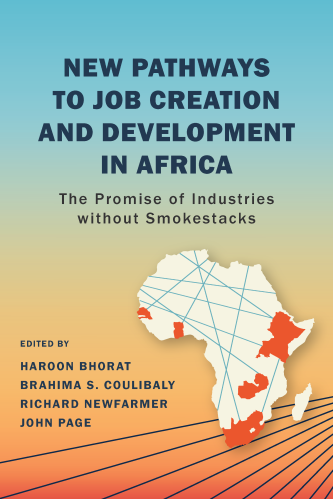
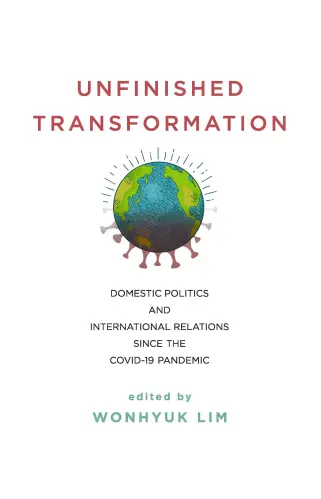
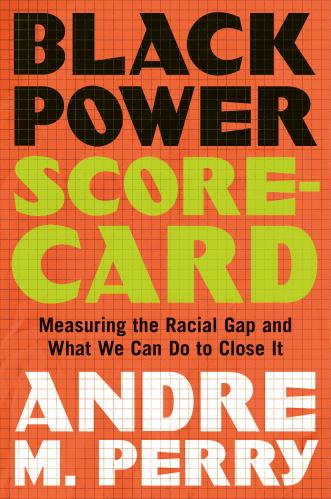



Commentary
Op-edMindanao: Living in the peace of the dead
August 18, 2016